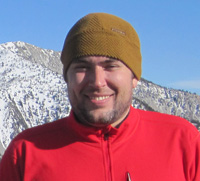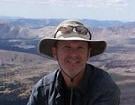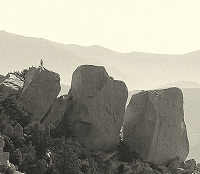elevation sickness/AMS
-
everyday

- Posts: 455
- Joined: Tue Mar 15, 2011 12:36 pm
What causes this? Ive never had it. Ryan says cause i live higher. But, even when I lived in Palm Springs, and went up to over 10,000ft, i never got it. I dont even get tired up high, unless im going uphill at that moment.
Is there a reason some get it and some never do? Or is it cause I run, so im not up high for as long as backpackers. ? Just curious if theres an actual scientific reason for the difference.
Is there a reason some get it and some never do? Or is it cause I run, so im not up high for as long as backpackers. ? Just curious if theres an actual scientific reason for the difference.
-
HikeUp

- Posts: 4036
- Joined: Thu Sep 27, 2007 9:21 pm
I don't run, live at 1000' or below and am really out of shape. Never have gotten altitude sickness, even at 12000'. I think it's random?
-
fortified
- Posts: 105
- Joined: Sat Mar 02, 2013 10:03 pm
You can find better info than mine by searching......but...
The last time I got it, I thought I was dying.
As I remember, It is your bodies reaction to less oxygen, rather than simply less oxygen. I was the only one that exercises in my family, and the only one that gets elevation sickness. Go figure...
I am an expert on NOT what to do as I did one time, and shall not do again.
1) Do not go from Almost zero elevation to a high elevation in one drive.
2) Do not start off from a really hot place (las Vegas) through the hottest place on Earth (death valley at 124 degrees).
3) Do not start at noon.
4) Do not ever, ever, EVER, start at noon, because you are very hung over from drinking and gambling all night in Las Vegas after the family goes to sleep, thus being severely dehydrated down to the cellular level, and over-heated, as you drive through the hottest place on Earth, in August!!!
5) Don't go to a major vacation spot like Yosemite in August without a reservation, thus going up and down many elevations trying to find a room.
6) Don't call Kaiser describing your symptoms of Angina, when they tell you you are authorized to go to any emergency room right now...if you do not take there advice, and decide that perhaps a couple of beers would serve as medicinal purposes to calm your body down.
But you may do what I did the next morning, and drive downhill, where you will find complete relief from most of your pain.
Happy trails :
The last time I got it, I thought I was dying.
As I remember, It is your bodies reaction to less oxygen, rather than simply less oxygen. I was the only one that exercises in my family, and the only one that gets elevation sickness. Go figure...
I am an expert on NOT what to do as I did one time, and shall not do again.
1) Do not go from Almost zero elevation to a high elevation in one drive.
2) Do not start off from a really hot place (las Vegas) through the hottest place on Earth (death valley at 124 degrees).
3) Do not start at noon.
4) Do not ever, ever, EVER, start at noon, because you are very hung over from drinking and gambling all night in Las Vegas after the family goes to sleep, thus being severely dehydrated down to the cellular level, and over-heated, as you drive through the hottest place on Earth, in August!!!
5) Don't go to a major vacation spot like Yosemite in August without a reservation, thus going up and down many elevations trying to find a room.
6) Don't call Kaiser describing your symptoms of Angina, when they tell you you are authorized to go to any emergency room right now...if you do not take there advice, and decide that perhaps a couple of beers would serve as medicinal purposes to calm your body down.
But you may do what I did the next morning, and drive downhill, where you will find complete relief from most of your pain.
Happy trails :
-
MattCav

- Posts: 356
- Joined: Thu Sep 23, 2010 4:13 am
this is something i've done a lot of research into.
there are factors that can contribute (physique, experience at altitude, heredity, speed of ascent, diet) but some people are just more prone to it than others. i know ultra marathoners who have gone up to elevation for the first time and had severe AMS and i know people that are extremely overweight who have been fine. i had been above 10k probably a dozen times and never had it until a couple years back at trail camp on mount whitney (12k). it was close to the best shape i'd ever been in and it smacked me down hard. i've been prone to it since.
the best cure for it is prevention. electrolytes and hydration are dietary necessities. rest is also helpful. recently i've begun taking diamox, gingko biloba, and stinging nettles, all of which are supposed to help with oxygen flow to the brain and rest of the body, and even though its a small sample size, it's helped a lot seemingly.
there are factors that can contribute (physique, experience at altitude, heredity, speed of ascent, diet) but some people are just more prone to it than others. i know ultra marathoners who have gone up to elevation for the first time and had severe AMS and i know people that are extremely overweight who have been fine. i had been above 10k probably a dozen times and never had it until a couple years back at trail camp on mount whitney (12k). it was close to the best shape i'd ever been in and it smacked me down hard. i've been prone to it since.
the best cure for it is prevention. electrolytes and hydration are dietary necessities. rest is also helpful. recently i've begun taking diamox, gingko biloba, and stinging nettles, all of which are supposed to help with oxygen flow to the brain and rest of the body, and even though its a small sample size, it's helped a lot seemingly.
-
OutdoorAbstract
- Posts: 32
- Joined: Thu Jan 22, 2009 4:43 am
My personal experiences in the Sierras indicate that avoiding high levels of exertion makes a big difference. Cruise up drinking LOTS of water, no problems. Race up with exertion levels right at anaerobic threshold hour after hour (right from sea level), problems with headache/nausea.
-
ALAWH

- Posts: 13
- Joined: Sun Nov 04, 2012 2:46 pm
We did the Main Mt. Whitney Trail on Sunday and three out of four of our group struggled with the altitude. I was the only one that was fine. Two of us spent three days prior in Mammoth at 8,000 ft. The other two drove up to Lone Pine two days before our ascent. One started struggling before Trail Camp at 12,000ft and the other two had an increasingly difficult time once we hit Trail Crest at 13,600ft. The final two miles to the summit were miserable for the three of them and they didn't feel any better on the descent until we were back down near trail camp. I have zero answers about why I didn't have any problems, we're all in similar physical shape, did the same training hikes, etc.
-
ALAWH

- Posts: 13
- Joined: Sun Nov 04, 2012 2:46 pm
BTW...we had Diamox with us and everyone opted to skip it. Looking back all three said they would have taken it and dealt with the side effects.
-
Taco

- Snownado survivor
- Posts: 6134
- Joined: Thu Sep 27, 2007 4:35 pm
Some random points I have picked up in time:
*Some folks tend to have more issues with elevation than others, regardless of fitness levels relative to others in any group.
*You may climb without issue one or more times, yet have bad days other times, again regardless of fitness and history.
*I have no data to support this, but I have seen that the women I climb with at elevation seem to have an edge over the men. Again, no data, just observations.
*I always do better at higher elevation (for me, 12k+) when I am better hydrated. When I use a bladder and drink on the move (thus not requiring a break to get a bottle out of my pack), and when I drink regardless of thirst. Not always possible depending on temps and equipment carried. I have 'rediscovered' bladders as a result, and now carry one often.
*Same point with food intake, though to a lesser extent.
*I have been told that the outcome is essentially random. This is from a person who has climbed at altitude (14-20k) for decades, who has a friend who studies this in a medical context.
If I was to climb a 14'er off the couch (as I live in LA now, so everything is off the couch), I would try to spend two days and a night at least on a local peak above 9k, such as Baldy or better yet, San G and Jepson area, and I would concentrate on hydration and proper nutrition as well as simply putting in a lot of work to at the very least get mentally ready for the slow diesel-engine-like performance of trudging up a higher peak, when everything becomes harder and slow.
Just my side, worth a little to me.
*Some folks tend to have more issues with elevation than others, regardless of fitness levels relative to others in any group.
*You may climb without issue one or more times, yet have bad days other times, again regardless of fitness and history.
*I have no data to support this, but I have seen that the women I climb with at elevation seem to have an edge over the men. Again, no data, just observations.
*I always do better at higher elevation (for me, 12k+) when I am better hydrated. When I use a bladder and drink on the move (thus not requiring a break to get a bottle out of my pack), and when I drink regardless of thirst. Not always possible depending on temps and equipment carried. I have 'rediscovered' bladders as a result, and now carry one often.
*Same point with food intake, though to a lesser extent.
*I have been told that the outcome is essentially random. This is from a person who has climbed at altitude (14-20k) for decades, who has a friend who studies this in a medical context.
If I was to climb a 14'er off the couch (as I live in LA now, so everything is off the couch), I would try to spend two days and a night at least on a local peak above 9k, such as Baldy or better yet, San G and Jepson area, and I would concentrate on hydration and proper nutrition as well as simply putting in a lot of work to at the very least get mentally ready for the slow diesel-engine-like performance of trudging up a higher peak, when everything becomes harder and slow.
Just my side, worth a little to me.
-
JeffH

- Posts: 1349
- Joined: Sun Nov 28, 2010 7:09 am
Plus one on that. I've been to Whitney each of the last 11 years and some days are worse than others. Turned around at Trail Crest once when I was just staggering around on the trail.Taco wrote: *You may climb without issue one or more times, yet have bad days other times, again regardless of fitness and history.
I try to go a couple days early and just hang out at elevation to acclimate.
"Argue for your limitations and sure enough they're yours".
Donald Shimoda
Donald Shimoda
-
Sean

- Cucamonga
- Posts: 4249
- Joined: Wed Jul 27, 2011 12:32 pm
I agree that diet and nutrition are key factors. If you do not keep yourself adequately hydrated and fed, then your body cannot focus on respiration, which is critical when the oxygen pressure drops the higher you go. A dehydrated and/or famished body will focus on finding emergency energy by burning fat stores or muscle tissue in extreme cases. If you continue to try to function at a high level while burning your emergency supply of energy, then you are simply asking for trouble. Your body will automatically begin shutting down circulation and respiration. Bad things will happen. Your digits will go numb, your head will ache, your mouth will dry out, you'll have trouble breathing, you'll have coughing fits, dizziness, maybe you'll feel faint. These are all signs that you need to stop, rehydrate, fuel up, and rest for a bit. And if that doesn't work, descend.MattCav wrote: the best cure for it is prevention. electrolytes and hydration are dietary necessities. rest is also helpful.
In my experience, trail runners cannot achieve such a high level of fitness without a strong focus on hydration and nutrition, which might be why "everyday" doesn't experience AMS symptoms.
-
cougarmagic

- Posts: 1411
- Joined: Wed May 07, 2008 5:21 pm
It seems a bit random to me too. I never had a problem on many hikes up to about 12k'. Until that trip to Cottonwood lakes....whoah nelly, what a headache. I attribute that to a fast ascent, too much weight and too little water intake.
I haven't felt bad since, but that was bad enough to serve as a warning to me and now I force myself to drink and eat enough.
I think you'll generally be fine, but should be prepared to know what symptoms might slam you, and that it might come out of nowhere.
I haven't felt bad since, but that was bad enough to serve as a warning to me and now I force myself to drink and eat enough.
I think you'll generally be fine, but should be prepared to know what symptoms might slam you, and that it might come out of nowhere.
-
Ze Hiker

- Posts: 1432
- Joined: Mon Jul 28, 2008 7:14 pm
Aside from the points already mentioned, I would say being in great conditioning can actually hurt. You can withstand going anaerobic for longer (happens more quickly at altitude) so you can withstand keeping a high vertical ascent rate. The fast ascent in altitude, combined with the high stress / level of exertion is a double-whammy to induce AMS symptoms.
-
Sean

- Cucamonga
- Posts: 4249
- Joined: Wed Jul 27, 2011 12:32 pm
Assuming hydration is a key factor in preventing AMS, then women will have some natural advantages over men:Taco wrote: *I have no data to support this, but I have seen that the women I climb with at elevation seem to have an edge over the men. Again, no data, just observations.
1. Women generally have less body hair, making it easier to air-cool their skin. Thus, they sweat less than men and lose less water that way.
2. Women are generally smaller in build and require less water to function than men.
3. Premenstrual women, and perhaps women in general, retain more water than men.
4. Also, women must regularly replenish about 35 milliliters of blood each month after menstruation. Perhaps this gives them a small advantage in acclimation, due to their body already being accustomed to the sudden need for more red blood cells, which are responsible for carrying oxygen throughout the body
-
everyday

- Posts: 455
- Joined: Tue Mar 15, 2011 12:36 pm
im gonna have to disagree here. As im a trail runner in yosemite and on a normal day off i run up an over 10 and 11000ft mountains, and have never had an issue (that being the reason for the original post.) I also stated in the first post, that even befor living higher, back when i lived at sea level, i had no problems even then when going up to 0ver 10000+ ft. And ive never personally known a trailrunner whe did get it. I think Seans right, we keep ourselves much better hydrated than most, we know not to wait to drink until thirsty(you wanna drink befor you feel it) Also, I dont drink alcohol, or eat processed food or fast food or microwave food or hardly anything with manmade chemicals, i take wholefoods on runs, like blackbeans smeared on corn tortillias, organic oatmeal cookies, etc. Basically, i cant afford to eat anything thats not nutient rich, both on runs and everyday at home. I mostly eat veggies n oats n fruite, i only eat meat very rarely, and its a side for flavor, never the main dish. and i never drink sodas,,,well, you get the idea. And all that stuff impacts how your body functions down to the cellular level. It also helps that i have lived at 2 national parks the last 4 years, so i run at elevation every single day, i dont drive there on weekends to train, its my lifestyle, not a workout. And ive seen others who live similarly have no probs either. just my observationZé wrote: Aside from the points already mentioned, I would say being in great conditioning can actually hurt. You can withstand going anaerobic for longer (happens more quickly at altitude) so you can withstand keeping a high vertical ascent rate. The fast ascent in altitude, combined with the high stress / level of exertion is a double-whammy to induce AMS symptoms.
-
Ze Hiker

- Posts: 1432
- Joined: Mon Jul 28, 2008 7:14 pm
While being a trail-runner means you are in shape, it doesn't necessarily indicate a high-level of fitness.
If you are going up 3000 ft / hr for 11000 ft, you are more likely to get altitude sickness than going up 1500 ft / hr.
Going uphill working at 95% max heart rate is going to make you suffer more from altitude symptoms than working at 75% max heart rate.
These are quantifiable measures. They aren't absolutes but just trends that affect probability of AMS. When you are stating you aren't getting altitude sickness, where does your quantifiable effort lie?
If you are going up 3000 ft / hr for 11000 ft, you are more likely to get altitude sickness than going up 1500 ft / hr.
Going uphill working at 95% max heart rate is going to make you suffer more from altitude symptoms than working at 75% max heart rate.
These are quantifiable measures. They aren't absolutes but just trends that affect probability of AMS. When you are stating you aren't getting altitude sickness, where does your quantifiable effort lie?
-
Sean

- Cucamonga
- Posts: 4249
- Joined: Wed Jul 27, 2011 12:32 pm
You have a good point Ze, but keep in mind that Everyday stays within the "High Altitude" range (5k-11.5k). This is the low-end of the spectrum for AMS. I live at 400 ft and regularly ascend to Baldy within a matter of a few hours without a problem. I have also ascended from Lone Pine to Whitney in about seven or eight hours with only a mild headache because of not drinking enough water.Zé wrote: If you are going up 3000 ft / hr for 11000 ft, you are more likely to get altitude sickness than going up 1500 ft / hr.
At some point, however, perhaps around 15 or 16k, I would expect more and dangerous symptoms of AMS, if I didn't stop to acclimate. The human body, no matter how conditioned, has limits. I suspect that Everyday simply hasn't reached hers.
Like Matt said, there are many factors to consider. Age is another one. I think the older you are the harder it is for your body to respond to fast elevation gains.
-
everyday

- Posts: 455
- Joined: Tue Mar 15, 2011 12:36 pm
@ Sean, not his, hers, Ima girl. and you are right, when i lived at the Grand Canyon, i was living at 7000ft elevation for 14 months and all my runs took me down in ele. and here in yosemite, ive lived at 4000ft elevation , for the last 13 months,. my runs, so far, have only taken me to 10 n 11000ft.
Ze- I will try n find a bigger mtn to run up this year and let ya know how i felt! im doing a 40mile run from yosemite valley, to and up, Vogelsange and back on thursday, but thats still only 11000+ft.
Ze- I will try n find a bigger mtn to run up this year and let ya know how i felt! im doing a 40mile run from yosemite valley, to and up, Vogelsange and back on thursday, but thats still only 11000+ft.
-
Sean

- Cucamonga
- Posts: 4249
- Joined: Wed Jul 27, 2011 12:32 pm
Sorry. I fixed the mistake in the post.everyday wrote: @ Sean, not his, hers, Ima girl.
Incidentally, last year Brett Maune drove from Los Angeles to Whitney Portal, and then immediately sprinted up to Whitney via the Mountaineer's Route in 1:56:54. In his trip report he mentions that he has "a several hour window" before experiencing altitude sickness symptoms.
-
everyday

- Posts: 455
- Joined: Tue Mar 15, 2011 12:36 pm
also at Ze, i have no clue what quantifiable effort even means or how you measure it, i never finished highschool. I just run to be happy 'n when im tired i run slower, when i feel good i go faster, and when it gets dark, i head home. and I dont have a heart beat measuring thing. I know from dr apps,though that my resting heartrate is 48bpm, and my bp is 90/60 and he says im the fittest patient he has I dont get all scientific about running, maybe i would if i entered a race ever, i just do it cause its a lot of fun, and , if i didnt or couldnt run, ide completely lose my mind n end up ina clocktower with a rifle or some shit, seriously, i come completely apart when i cant get out. Its why i live here. Im not someone who runs for weightloss or fitness, i do it because its who i am, nothing makes me happier than running all day on my days off work, a good 8-10 hour run every weekend is the best thing ever, (on workdays, i only get in 90min-2hrs) if i wasnt a trailrunner, i wouldnt be me. im pretty sure ide die 
-
everyday

- Posts: 455
- Joined: Tue Mar 15, 2011 12:36 pm
its okSean wrote:Sorry. I fixed the mistake in the post.everyday wrote: @ Sean, not his, hers, Ima girl.
Incidentally, last year Brett Maune drove from Los Angeles to Whitney Portal, and then immediately sprinted up to Whitney via the Mountaineer's Route in 1:56:54. In his trip report he mentions that he has "a several hour window" before experiencing altitude sickness symptoms.
and, that sounds like what my theory was, (his "several hour window" thing) im simply not up there long enough
-
Ze Hiker

- Posts: 1432
- Joined: Mon Jul 28, 2008 7:14 pm
I don't disagree. Everyone is less likely to get symptoms at lower elevations - but it is more likely to happen the faster the ascension and harder you are working.Sean wrote: You have a good point Ze, but keep in mind that Everyday stays within the "High Altitude" range (5k-11.5k). This is the low-end of the spectrum for AMS. I live at 400 ft and regularly ascend to Baldy within a matter of a few hours without a problem. I have also ascended from Lone Pine to Whitney in about seven or eight hours with only a mild headache because of not drinking enough water.
At some point, however, perhaps around 15 or 16k, I would expect more and dangerous symptoms of AMS, if I didn't stop to acclimate. The human body, no matter how conditioned, has limits. I suspect that Everyday simply hasn't reached hers.
Like Matt said, there are many factors to consider. Age is another one. I think the older you are the harder it is for your body to respond to fast elevation gains.
Keep in mind there are really different parts of AMS - there's the 'real' / severe problems (HAPE/HACE) which could be avoided if the window at altitude is small.
However, feeling dizzy, headache, nausea, happen early and are partially due to the hyperventilation aspect of being at altitude.
The only time I felt crappy at altitudes <= 11.5 k ft was when I was going balls out - a very very high workrate that I'd guess most aren't trying. So my point is at 11 k there are still limits, but you might have to really push to get there, it's not surprising everyday doesn't experience any altitude symptoms as she probably has good ability to deal with it in general plus not going balls out.
Everyday, the best test is just have you go run up the main Whitney trail! Let us know when you do!
-
VermillionPearlGirl
- Posts: 239
- Joined: Wed Apr 06, 2011 9:57 am
I am the world's most susceptible human being to altitude sickness  I'm like a human altimeter, I can tell you what elevation we're at by how I feel (we played this game in the grand canyon once, I was always within a couple hundred feet!).
I'm like a human altimeter, I can tell you what elevation we're at by how I feel (we played this game in the grand canyon once, I was always within a couple hundred feet!).
I start feeling it as low as 5000 ft. Nausea, headaches, nose bleeds, dizzy, crazy sluggish -- and like Ze said they happen early. Usually I kind of acclimate as we go and after an hour or two I'm totally fine.
But HACE/HAPE can happen to anyone at any time even if it has never happened before. Read "Into Thin Air" -- Scott Fischer had climbed a number of 8000m peaks with no problems, but got altitude sickness that day.
The key is just to know what to look out for and if you're feeling particularly slow and sluggish and having any other symptoms, take them seriously. I'm always willing to turn around if my symptoms don't start to improve.
I start feeling it as low as 5000 ft. Nausea, headaches, nose bleeds, dizzy, crazy sluggish -- and like Ze said they happen early. Usually I kind of acclimate as we go and after an hour or two I'm totally fine.
But HACE/HAPE can happen to anyone at any time even if it has never happened before. Read "Into Thin Air" -- Scott Fischer had climbed a number of 8000m peaks with no problems, but got altitude sickness that day.
The key is just to know what to look out for and if you're feeling particularly slow and sluggish and having any other symptoms, take them seriously. I'm always willing to turn around if my symptoms don't start to improve.
